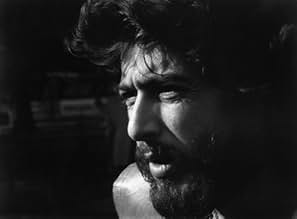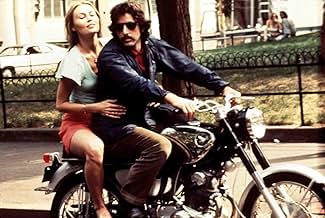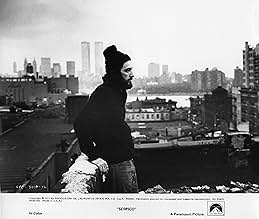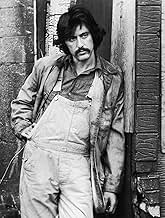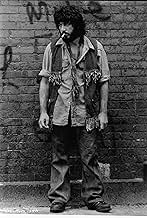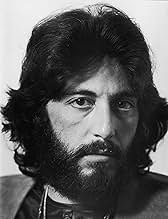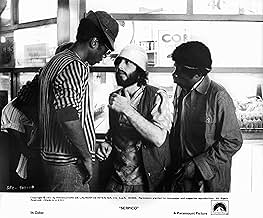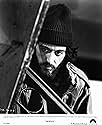Serpico
- 1973
- Tous publics
- 2h 10m
An honest New York cop named Frank Serpico blows the whistle on rampant corruption in the force only to have his comrades turn against him.An honest New York cop named Frank Serpico blows the whistle on rampant corruption in the force only to have his comrades turn against him.An honest New York cop named Frank Serpico blows the whistle on rampant corruption in the force only to have his comrades turn against him.
- Nominated for 2 Oscars
- 8 wins & 13 nominations total
Barbara Eda-Young
- Laurie
- (as Barbara eda-Young)
Edward Grover
- Lombardo
- (as Ed Grover)
Albert Henderson
- Peluce
- (as Al Henderson)
Joseph Bova
- Potts
- (as Joe Bova)
Woodie King Jr.
- Larry
- (as Woodie King)
- Director
- Writers
- All cast & crew
- Production, box office & more at IMDbPro
Featured reviews
Sidney Lumet is a director who captures something crucial in city based dramas surrounding legal and political affairs; with films like '12 angry men', 'the verdict', 'nightfalls on Manhattan' and 'Q & A' he shows an excellent grasp of the power plays in civic politics. In 'Serpico' he uses an excellent script to tell the story of an unorthodox character in Frank Serpico, a hippie in a time when most cops were square as a doorway but whose honesty when faced with police corruption marks him out as a man of remarkable character. Unflinching in its depiction of Serpico, the film portrays warts and all, over the period in which he refuses to take money and shows his extraordinary political vindication at an official investigation into NYPD corruption. The story of civic corruption is cogent in any time, one only has to look at great empires like Rome to understand how much corruption plays a part in the shaping of so called civilizations; where the very foundation stones have bodies, so to speak, buried under them or even within them. This film is both informative and honest in much the way 'All the Presidents Men' would be in the following year. Winning Al Pacino a deserved Oscar nomination in the years between the Godfather's Part I and II; it demonstrates the range of an actor who would go on to portray a character in Michael Corleone soon afterwards who is the very nemisis of the character in Serpico. In Serpico there is a dramadocumentary that calls to mind Shakespeares history plays in its depiction of a classical situation of a man ostracized and driven by noble sentiments to embody something of the civic value one expects of servants of the public trust. Brilliant film. 10 out of 10.
9dtb
I'd been wanting to see SERPICO for some time; this real-life crime drama based on Peter Maas' nonfiction bestseller about an honest cop fighting corruption in the NYPD was one of the few grim-and-gritty New York crime dramas that my older brother didn't take me to see when I was a kid! :-) (I should explain that my brother, 9 years my senior, used to take me to the kind of movies he wanted to see -- films like TAXI DRIVER, REPORT TO THE COMMISSIONER, etc. Fortunately, I developed a taste for them as well, though our mother didn't think they were really appropriate for a girl as young as I was then. :-) No wonder this film helped young Al Pacino's then-rising star (he was fresh off THE GODFATHER when he began filming SERPICO) to soar to the stratosphere, complete with an Oscar nomination. Pacino's earnest intensity fuses Frank Serpico's disparate qualities into a spellbinding performance. The guy is a bundle of contradictions, the kind of man who could charm you, move you, and drive you crazy at the same time: a nice Catholic boy who can't commit to any of the devoted women in his life; an honest, downright rigid moralist who's also a free spirit known as "Paco" to his friends and lovers; and an undercover cop with detective aspirations whose hippie-like appearance rankled his superiors and fellow officers even as it helped him blend in on assignments. Pacino's riveting performance carries the film, with fine support by John Randolph, Tony Roberts, M. Emmet Walsh, Barbara eda-Young and Cornelia Sharpe, not to mention memorable uncredited turns by F. Murray Abraham, Judd Hirsch, Kenneth McMillan, and Tony LoBianco, among others. Sidney Lumet's taut direction of the script by Waldo Salt and Norman Wexler does Maas' source material proud, as well as taking advantage of evocative NYC locations (just try getting this kind of atmosphere in Canada, I dare you! :-). The sparing use of simple yet haunting music by Mikis Theodorakis sets the tone well. The end result: one of the best films of the 1970s and beyond. Rent the DVD to see some fascinating extras about the making of the film and the filmmakers' experiences with Frank Serpico himself, including interviews with Lumet and producer Martin Bregman (no Pacino, alas).
There have so many crooked-cops-themed films in the past 30 years that this film has lost a lot of its shock-and-awe. The long hair, wild clothes, beads, etc. really date this film, too, it being so early '70s in looks. It's almost become a "period piece" as if it were the Roaring Twenties except its the Sleazy Seventies.
All you have to do is look at the party scene in here and you'll get a glimpse at the early '70s, and most of it is not good. What IS good is Al Pacino's acting, of course. There have been very few films in which he starred that didn't displaying his acting talents to the fullest. This one, along with Dog Day Afternoon and few others, put him "on the map," making him a big star. He's been a "star" ever since.
This is a fairly long film but, like Pacino, it's rarely boring. The name of Pacino's character, "Serpico," has become synonymous with "honest cop." It demonstrates what a strong impact this movie had on millions of people.
Gritty? Yes. Profane? Yes; Memorable? Most definitely. When you speak of modern-day "classics," this film is one of them.
All you have to do is look at the party scene in here and you'll get a glimpse at the early '70s, and most of it is not good. What IS good is Al Pacino's acting, of course. There have been very few films in which he starred that didn't displaying his acting talents to the fullest. This one, along with Dog Day Afternoon and few others, put him "on the map," making him a big star. He's been a "star" ever since.
This is a fairly long film but, like Pacino, it's rarely boring. The name of Pacino's character, "Serpico," has become synonymous with "honest cop." It demonstrates what a strong impact this movie had on millions of people.
Gritty? Yes. Profane? Yes; Memorable? Most definitely. When you speak of modern-day "classics," this film is one of them.
Unquestionably one of the major films of the 70's dealing with a big theme (police corruption) and with some major talents at close to the top of their game throughout. Sydney Lumet spares us little in this gritty urban drama using almost fly-on-the-wall documentary technique to involve the viewer in the action and stand us directly alongside Pacino as crusading street-wise cop Frank Serpico. Serpico's naive idealism is at first bruised by what at first seems casual freeloading by almost everyone of his new colleagues on the force but which turns to literally a battering as he comes to appreciate just how endemic the inside corruption actually is. Lumet plants us firmly on location in contemporary downtown NY with its rundown apartment blocks, graffiti-strewn streets and lowlife criminal element (and that's just the police!) As for Serpico, we feel his frustration as he cracks under the pressure, his relationship with his girlfriend poisoned as he fails to make the powers-that-be sit up and address what to all intents and purposes is standard behaviour. It takes a great acting performance to carry the viewer all the way through this lonely journey, even when the character himself becomes at times obnoxious and unfeeling to his (few) supporters; thankfully Pacino gives a performance the real-life Serpico deserved. Only very occasionally lapsing into the "hoo-ha" overacting style that reached its nadir in "Scent Of A Woman", Pacino plays it cool and tight throughout, always wary, always looking over his shoulder, playing it for real. If one is slightly sceptical if not critical of his sometimes ridiculous-looking "Harry Hippy" persona, I think it can be forgiven as being of its time. The ensemble support acting is top-drawer too, everyone is believable as indeed they need to be to make this film work but particular praise should go to Barbara Eda-Young as his put-upon girlfriend and Tony Roberts, free of Woody Allen for once, as his main ally. It's not hard to see the prototypes here for the new generation cutting-egde TV shows which were soon to follow such as Kojak and particularly Hill Street Blues, but that's the least of this film's achievements. In summary then, this excellent film is proof that it's possible for Hollywood to address a potentially unpopular, certainly uncomfortable serious subject, make its point and still entertain.
Serpico is not a bad film, but it definitelty could have been better. Directing and acting are as good as they always are when Sidney Lumet and Al Pacino are involved. Pacino made a really Oscar-worthy performance, and Lumet's directing is brilliant, especially at the beginning of the film. And the story itself is gripping and intriguing. But the way it is presented is not that good as it may seem when you read the film's description. The script is not good enough, there are lots of useless dialoges and scenes. For instance, Serpico's two women almost don't make sense, especially the first one. They don't have influence on the story, but serve only for Serpico to express his attitude towards the police, which he expresses directly towards his collegues in the same way. His fellow policemen don't look like real bandits and most of them are shallow too. It seems as the film's crew made this film only for the ones who already knew everything about the real Frank. His story deserved to be presented more thoroughly. Nevertheless, the film is still good and I can recommend it.
Did you know
- GoofsThe prison "chain gang" being led into the wagon at the beginning has male and female prisoners on the same "chain," and both sexes are transported in the same wagon. The NYPD absolutely forbade that then, and still does.
- Quotes
Frank Serpico: The reality is that we do not wash our own laundry--it just gets dirtier.
- Alternate versionsThere is one Australian VHS version released through RCA Columbia Pictures Hoyts Home Video in the 1980s which had all profanity overdubbed with tamer language, as well as some scenes of sexuality/nudity. Subsequent releases on DVD are uncensored.
- ConnectionsEdited into The Kid Stays in the Picture (2002)
- How long is Serpico?Powered by Alexa
Details
- Release date
- Countries of origin
- Official site
- Languages
- Also known as
- Serpiko
- Filming locations
- Lewisohn Stadium, Amsterdam Avenue, Manhattan, New York City, New York, USA(Meeting Scene with Bob Blair)
- Production companies
- See more company credits at IMDbPro
Box office
- Budget
- $3,000,000 (estimated)
- Gross US & Canada
- $29,800,000
- Gross worldwide
- $29,857,918
Contribute to this page
Suggest an edit or add missing content




